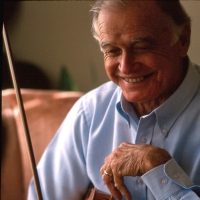
Jim Shumate
Jim Shumate
In the 1940s, musicians across the South began imitating a new sound created and popularized by Bill Monroe, Lester Flatt, and Earl Scruggs. As a fiddler who performed with these bluegrass legends, Jim Shumate pioneered innovations that are still admired and studied by musicians today.
Born on Chestnut Mountain in northern Wilkes County, Jim Shumate grew up hearing the sounds of his uncle playing fiddle at a neighboring farmstead. “He just played on his front porch when they got through working in the field,” he recalled. “Why, if the wind was coming in the right direction, I could hear him from our house down. And oh, it was so pretty.” He was also taken with the Grand Ole Opry’s premier fiddler, Arthur Smith. Smith’s style emphasized “long-bow” fiddling, in which a number of notes are played with each stroke of the bow. “I tried my best to play just like Arthur,” Mr. Shumate remembered. In addition to learning bowing techniques, he was also influenced by Smith’s fondness for playing bluesy slides.
As a teenager, Mr. Shumate went to work in a furniture factory but was soon playing on a local radio program in Hickory. One day, Bill Monroe was driving through North Carolina and happened to tune into the show. Shortly thereafter, Mr. Shumate received a surprise phone call from the father of bluegrass himself, who was in need of a fiddler. “He had heard me on this radio program,” remembered Mr. Shumate. “Asked me if I was the fellow that played such and such time, and I told him ‘yeah.’ He said, ‘You’re the type man I want if you want the job.’ So I said ‘Yeah! Be right there.'”
With his band the Blue Grass Boys, Monroe played each Saturday night on the Grand Ole Opry. The group spent the rest of the week performing at ballparks, theaters, and schoolhouses across the South. During these trips Mr. Shumate realized the extent of their influence. “Little groups were all over the country and every one of them would be trying to do the very same thing we had done on the Opry the night before,” he recalled. “I said, ‘Fellows, we’re making some kind of history, [but] I don’t know what it is.'”
While working on the Opry, Mr. Shumate introduced Monroe’s songs with a fiddle “kick-off” that quickly become standard practice in bluegrass music. In 1948, Earl Scruggs and Lester Flatt offered him a job with their group, the Foggy Mountain Boys, and Shumate fiddled on the legendary band’s first recording session. That same year, he outplayed some of the country’s best fiddlers to win the National Fiddler’s Convention in Richlands, Virginia. In 1949, Jim Shumate tired of life on the road and returned to Hickory for good to work in retail furniture sales. However, he continued to perform with his own band on radio and television and to make recordings.
In addition to having prowess as a fiddler, Mr. Shumate was a composer of sacred songs. His favorite, “Old Country Baptizing,” is now sung regularly in churches in western North Carolina. When asked to reflect on his musical talents, he was quick to acknowledge his blessings. “I just thank God for the gift that I have in it. And everyday I live I can play it a little better than I could the day before. So that’s got to be a gift, you know.”
Jim Shumate passed away on October 10, 2013 at the age of ninety-one.


